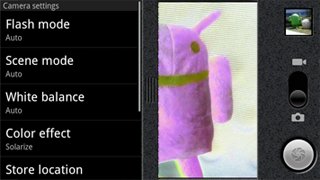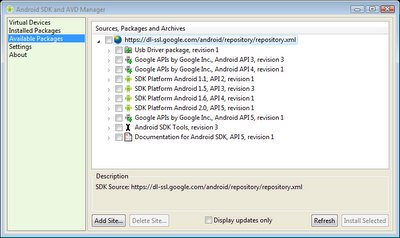Android 2.0 pumps up sync, contact APIs
Oct 28, 2009 — by Eric Brown — from the LinuxDevices Archive — 6 viewsThe Google-sponsored Android project has released version 2.0 of Android, featuring new APIs for sync, the account manager, and contacts. Among other enhancements, Android 2.0 (Eclair) features a “Quick Contact” feature that lets users tap a contact photo to call, SMS, or e-mail the person, says a story in eWEEK.
First previewed in June, the Android 2.0 release comes only about six weeks after Android 1.6 ("Donut"), which added CDMA support, QVGA and WVGA resolutions, a Quick Search Box, and a text-to-speech engine. The new Eclair release is expected to appear first on the much anticipated Motorola Droid smartphone, which is now expected to be announced by Verizon Wireless on Nov. 6, according to an eWEEK story by Clint Boulton.
 |
The Android 2.0 SDK (software development kit) offers new APIs for synchronization, the account manager, and contacts, enabling Android developers to write applications that allow users to sync devices to various contact sources, writes Boulton. The sync adapter API is said to support two-way contact sync to any back end, while the account manager API lets developers centrally store user credential information on phones. The contacts API supports syncing, while also aggregating email and contact data from multiple accounts, including Exchange, says the story.
The most notable new feature for non-developers is Quick Contact (pictured at right), which lets a user, for example, tap a contact photo to call, SMS (Short Message Service), or email the individual. Quick Contact functionality is also accessible via email, messaging, and calendar applications, says the story.
Android 2.0 adds a combined inbox feature that to lets users browse email from multiple accounts in one page, says eWEEK. In addition, users can now search all saved SMS and MMS (Multimedia Messaging Service) messages and automatically delete the oldest messages in a conversation according to a defined limit, says the story. Meanwhile, calendar features have been enhanced with an "infinite scrolling" feature, and the events feature now displays show the attending status for each invitee, as well as provides the ability to invite new guests.
The virtual keyboard is now said to be easier to use, with "an improved keyboard layout to makes [sic] it easier to hit the correct characters and improve typing speed," according to the Android developers site. It also offers multitouch support that "ensures that key presses aren't missed," as well as a dictionary that can learn from prior usage and pop up suggestions for contact name spellings.

New Android camera modes
New developers can download the Android SDK from the download site, while current developers can use the SDK Manager (pictured below) to add Android 2.0 support to their SDK. They can also update SDK Tools to the required Rev 3, which features Mac OS X 10.6 support.

Android SDK Manager
A video demonstrating Android 2.0
Source: Google
(click to play)
Availability
The Android 2.0 release notes, as well as links pointing to download sites, may be found here.
Clint Boulton's eWEEK story on Android 2.0 should be here.
This article was originally published on LinuxDevices.com and has been donated to the open source community by QuinStreet Inc. Please visit LinuxToday.com for up-to-date news and articles about Linux and open source.